Deborah J. Ross's Blog, page 26
August 22, 2022
Disabled People Love the Redwoods, too!
Get your FREE Guide, A Disabled Hiker’s Guide to the Redwoods.

Even if this information doesn’t apply to you, there’s probably someone in your life who could use it, so please share it with your friends and family.
Many accessible experiences can be had in redwood parks, from hiking and camping to incredible scenic drives. Home to the world’s tallest, largest, and some of the oldest trees, as well as biodiversity found nowhere else, these special places offer inspiration and enhance the well-being of all.
Our new, free e-guide provides an accessibility overview of 15 redwood and giant sequoia parks. We are grateful to have worked with Syren Nagakyrie, the founder of Disabled Hikers. Syren visited parks this year to review accessibility using ADA/ABA guidelines as well as using their personal and professional experience to research parks.
August 19, 2022
Short Book Reviews: The Mystery of the Crow Folk Revealed!
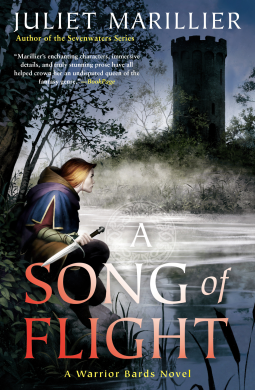 This latest novel in the “Warrior Bard” series will delight Marillier fans. After the events in The Harp of Kings and A Dance with Fate, everyone seems to have settled happily. Liobhan, who is both a skillful musician and an elite Swan Island warrior, is with her sweetheart, nobly born Dau, although by tradition they are not allowed to go on missions together. Her half-fey brother, Brocc, has retreated to the Otherworld with his fey wife and infant daughter, whom he adores. Swan Island continues to train young warriors and provide their special blend of espionage, counsel, and martial prowess. Then, of course, everything falls apart. Brocc’s attempts to establish a truce with the vicious Crow Folk lead to his and his daughter’s expulsion into the mortal realm. Dau’s latest mission puts him at risk of encountering the brother who tortured him and Liobhan, and a crown prince has gone missing and is possibly dead. Disparate story lines gradually weave together as the true menace emerges, along with the alliance that will defeat it.
This latest novel in the “Warrior Bard” series will delight Marillier fans. After the events in The Harp of Kings and A Dance with Fate, everyone seems to have settled happily. Liobhan, who is both a skillful musician and an elite Swan Island warrior, is with her sweetheart, nobly born Dau, although by tradition they are not allowed to go on missions together. Her half-fey brother, Brocc, has retreated to the Otherworld with his fey wife and infant daughter, whom he adores. Swan Island continues to train young warriors and provide their special blend of espionage, counsel, and martial prowess. Then, of course, everything falls apart. Brocc’s attempts to establish a truce with the vicious Crow Folk lead to his and his daughter’s expulsion into the mortal realm. Dau’s latest mission puts him at risk of encountering the brother who tortured him and Liobhan, and a crown prince has gone missing and is possibly dead. Disparate story lines gradually weave together as the true menace emerges, along with the alliance that will defeat it.I enjoyed A Song in Flight very much, especially the chance to spend more time with my favorite characters, watch Dau and Liobhan recover from the traumatic experiences of the last book, and delve the mysterious origin of the Crow Folk. Without having read the previous two books, however, much of this one would have been confusing. This is an issue every author who writes multi-volume series faces. If you put in enough background to fully orient a new reader, you risk losing faithful fans through repetition and boredom. Marillier does a fine job reminding the reader without bashing over the head, but in the end, it’s best to read the previous volumes in order.
August 12, 2022
Short Book Reviews: Another Time-Traveling Mystery Romance from Kelley Armstrong
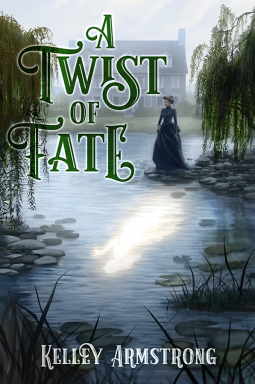
A Twist of Fate, by Kelley Armstrong (Subterranean)
This time-traveling-mystery-romance, set in the world of A Stitch in Time, is every bit as charming. In the first book, a door through time allowed 21st Century Bronwyn and 19th Century William to fall in love and build a life together. William’s best friend, August Courtenay, has suffered a double loss. First his sister, drowned in the pond on the family estate. And then his beautiful wife, Rosalind, who went riding along the ocean cliffs one night and never returned, leaving her husband to raise their infant son alone.
Rosalind did not perish, as everyone believes. On an impulse, she rode out to William and Bronwyn’s home and stumbled through the time portal. For the past four years, she’s been marooned in the present time, learning new skills while she desperately searches for a way to return.
Now she’s back.
Matters are not so simple as a happy reunion. First she has to explain her absence to her possessive husband. After the death of his sister, he’s likely to think she abandoned him. Has he remarried? Is he happy in a new life? Rosalind decides to investigate before showing up on his doorstep and through a twist of fate, ends up as her young son’s new governess. Not only that, but her son is one of the few people who can see the ghosts that haunt the mansion, a gift of his mother’s “Second Sight.” Who—or what—are the ghosts after?
Rosalind’s first-person voice is engaging and emotionally urgent. I loved all the ways she had adapted to modern life and then took those skills and empowerment back to the past. Her fierce, unwavering devotion to her son was pitch perfect. On the minus side, I had trouble with how much she dithered about telling August who she was under her convincing disguise. Like other readers who are not primarily romance fans, I find the misunderstandings created by the lack of a simple, direct conversation frustrating, although they are common to the genre. To Rosalind’s credit, she is in many other ways a resourceful character. One of the high points of the story came near the very end, when she confronts her husband with his pathological abandonment issues and informs him that he will have to work through them.
If you, like me, loved Bronwyn and William’s story, you’ll want to grab this one, too!
August 5, 2022
Short Book Reviews: Dr. Moreau in Yucatan
The Daughter of Doctor Moreau, by Silvia Moreno-Garcia (Ballantine)
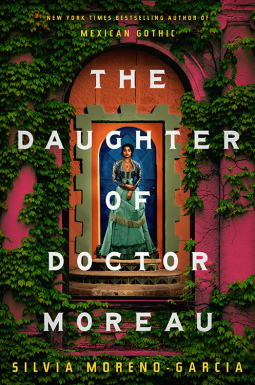
My introduction to the Mexican-centered fantasy of Silvia Moreno-Garcia was her re-telling of the Cinderella story, Gods of Jade and Shadow. Now she offers a fresh interpretation of H. G. Wells’s classic novel, The Island of Doctor Moreau. Instead of retreating to a hidden island to perform his experiments, this Dr. Moreau seeks the relative solitude of the Yucatán jungles, on an estate owned by a wealthy man in search of cheap, malleable plantation laborers. Under the pretense of developing such workers, Dr. Moreau creates human-animal hybrids from various animals. They are, alas, less than functional, with rapid aging, joint problems, and other issues. Only his beautiful, meek, and secretly rebellious daughter, Carlota, is perfectly human. Dr. Moreau needs a majordomo to run the estate and care for the infirm hybrids, so he hires Montgomery Laughton, a drifter heavily in debt and drowning a broken marriage in drink. Isolated and surrounded by lush forest and fascinating creatures, Montgomery begins to slowly form a friendship with Carlota and to heal.
When the landowner’s charming and egotistical son arrives at the estate, he is instantly smitten with Carlota, thereby setting into motion a cataclysmic chain of events.
Like other of Moreno-Garcia’s adventures, The Daughter of Doctor Moreau is strongly character-driven. Maturation and healing are the twin lenses that focus the action, which begins slowly in the near-static serenity of the estate and builds to a breathless climax. At first, I found Carlota childish, especially her constant verbal sparring with her two closest hybrid friends. Her flirtation with the landowner’s son struck me as dangerously naïve. As the story went on, however, I noticed the parallels between her increasing understanding of the world at large and of herself. Her capacity for acceptance—of her friends, of her father, of Montgomery with his tortured past, and of her own true nature—emerges as the moral and emotional center of the book.
August 1, 2022
Auntie Deborah is Still Giving Writing Advice
 Dear Auntie Deborah...
Dear Auntie Deborah...I wrote a story using another person's characters, even though they said not to. Can I publish it since their book isn't copyrighted? If the author has published their story in any form, it’s copyrighted. That, however, is beside the point. It’s just plain unethical to do what you suggest. It’s a great way to make enemies in your genre and create a horrible reputation that will haunt your career, assuming you still have one after such a bonehead move.Create your own characters. Write your own stories. Treat your colleagues and their work the way you would like to be treated. Pursue your career with integrity and generosity.
Are self-published books inferior to professionally published books? It all depends.
Not that long ago, self-published or vanity press books were assumed to be of inferior quality, that is to say, unpublishable by “real” (traditional) publishers. There were exceptions, of course, but that was the conventional wisdom.
Today, however, many self-published books go through the same rigorous editing and quality standards as traditionally published books. Some genres, like romance, are especially friendly toward self-pubbed projects.
With modern publishing technology (ebooks, POD printing), there are many reasons why a pro-level author might want to self-publish, including:Niche projects, like memoirs or family histories.Series that were dropped by trad publishers but that have an enthusiastic fan following.Well-written books that don’t fit into the NY “best-seller” model.OP (out-of-print, rights reverted to author) backlist.Great books that straddle genres or otherwise confuse traditional marketing/sales departments.That said, many self-published books are dreadful. They aren’t good enough to attract the interest of an agent or publisher to begin with, they aren’t professionally edited or proofread, the covers are amateurish, and so on. The challenge for the reader is to sort out those books that are truly a wonderful reading experience.
Does reaching a certain number of reviews increase your indie sales?
The short answer is that nobody knows. Theories abound, usually to line the pockets of the “experts.” “Gaming” the Amazon system is a losing proposition. What might have been true 2 years or 6 months or last week no longer works — because thousands of self-published authors have tried it, thereby flooding the system with meaningless tweaks.
If you want to increase your sales, write a great book. Publicize it. Get stellar reviews on Publishers Weekly and the like. Write an even better book. Rinse and repeat. Even then, there are no guarantees when it comes to sales, but you’ll have the satisfaction of writing really good books.
My first attempt at a novel is a New Adult Romance novel using the Three Act Structure and I'm floundering. Help! I’ve been writing professionally for over 35 years and this is what works for me: I noodle around until the story catches fire. Then I have some idea of: the hook, one or two plot points/reversals, the big climax, and the emotional tone of the ending. Sometimes I fall in love with the characters and they run away with the story. If I’m selling on proposal, I use that much to generate a synopsis. If it’s on-spec, I dive in. As long as I feel as if I’m flying or surfing the story, I keep on. I use things like structural analysis only if I feel stuck.
The thing is, and always has been for me (12+ trad pub novels, 60+ short stories, plus collections and non-fic), I go where the creative joy is. Anything else is a boring slog.
All this said, I write fantasy and science fiction, where fluid structures are appreciated. Romance is much more formulaic. Consider that your muse might be leading you to write a love story, not a by-the-numbers romance. Always, always listen to your heart.
How can I conquer my fear of rejection and finally put myself out there?Being discouraged is part and parcel of a working writer's life. Negative reviews, ditto. Some of us are naturally more thick-skinned about them than others, and most of us develop coping strategies over the years. This is where networking with other writers can be very helpful. We say things like:
If you're not accumulating rejection slips, you're not doing your job (taking risks, "pushing the envelope").Just file the slip (or email) and send the story out.Editors are human, too; they have bad days, and it's no one's fault if your hero has the same name as their much-reviled ex.Hey, I'm making progress from a form rejection to a personal note and invitation to submit again!Even after many professional sales, a rejection can sting. The sting doesn't last as long as it might when we were first starting out, and we have tools (see above) and lots of writerly commiseration to help us. We know from experience that the sting will pass; we have acquired the habit of immediately diving back into the next project so we always have something fresh and exciting in the pipeline.
Then there are the situations when a story or book is sold and the publisher goes out of business. The editor gets fired. I know authors this has happened to more than once. We find ourselves wondering if we killed the magazine. We didn't, but that laughter overlays the secret and utterly illogical fear that our writing careers are somehow jinxed. Then we sell something else and there are no thunderbolts from above. We carry on.
Reviews, ah reviews, and in this category I include feedback from critique groups and beta readers. So much has already been said about the power of a caustic review or harsh feedback on a work in progress that I won't belabor the point here. Suffice it to say that the natural human desire for praise (for our creative "children") leaves us vulnerable to interpreting criticism of the work with condemnation of ourselves. Or, having torn off our emotional armor to write from the heart, we've also ripped off any defenses against sarcasm, etc. I'm among those who, having received scathing feedback, went home and cried. I never considered giving up (although on more than one occasion, I contemplated getting even and thankfully resisted the temptation). But some writers have.
Negative feedback, if consistent and prolonged, can have a devastating effect on a writer's self-confidence and ability to work. Support and encouragement from our fellow writers can be our greatest asset in setting aside the nasty things people have written about our stories. A hiatus from reading reviews is highly recommended.
Another form of discouragement arises when a novel gets published, gorgeous cover and all, and sales are abysmal. Sometimes this means you're dead at that publisher, but other times they'll take a longer view and be patient. Or they might want you to change your byline or genre to get a fresh start, so the poor sales figures don't haunt new releases.
Sooner or later, this will happen to most of us. We reach for the support and tools that have helped us survive rejection letters, bad reviews, and writer's block. If it's a single book or a book now and again, we can usually get through the disappointment. But when it happens repeatedly, it can be even more catastrophic than those early rejections. We've enjoyed a period of success and self-confidence. We've sold a book or twelve. We know how to do this. Our fans love us. We're professionals. And then our next book flops. And the one after that. And we change our names and write something different. And the same thing happens. Our publisher dumps us. Maybe our agent dumps us. It would be a miracle if we did not feel discouraged.
This has happened to writers I know. Some of them have kept writing, and eventually hit their stride and connected with an enthusiastic readership again. Others gave up.
It's happened to me, too. I've written books that my editor loved and that those few readers who bought adored and wrote glowing reviews about...and that simply did not sell worth beans. Some days I'm sure I'll never amount to anything, I can't write my way out of a wet paper bag, and what's the use? Other days, I chalk it all up to practice. Sometimes I admit I have no idea why some books sell like wildfire and others, equally or more wonderful, fizzle. I tell myself I'm paying my dues as a professional, no matter how obnoxious and painful these particular dues are.
Then I remind myself of the question: If your work would never be published, would you still write? And my answer is yes. Because these stories are in my heart, and because when the words flow, there's nothing like that creative high. Maybe it's just the luck of the draw that folks want to read what I write. I treasure those readers who take the time to let me know how much my work has meant to them. A readership of one (myself) is enough; a readership of that small community is the whipped cream and chocolate sprinkles and cherry on top.
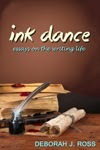
This and other essays are in my collection, Ink Dance: Essays on the Writing Life. If you like what I said, I hope you’ll check it out (at all the usual vendors, plus a print edition with space for personal notes.)
July 29, 2022
Book Reviews: Naomi Novik's Deadly Magical School
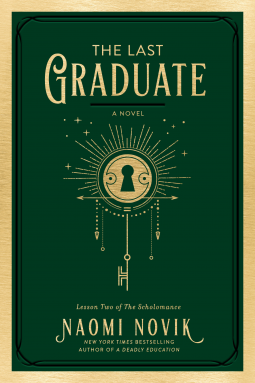
The Last Graduate, by Naomi Novik (Ballantine)
I’ve loved Naomi Novik’s work since discovering her “Napoleonic Wars With Dragons” series (Temeraire). It seemed to me that with each book, both in that series and more recent publications, she has grown in skill and depth. I read the first two volumes of “Scholomance” back-to-back. It’s fair to say I inhaled them, they were so good.
I’ve been reading a bunch of magical school stories recently, and the Scholomance books redefine the genre. Many of the other books use a boarding school-like setting, whether it’s Hogwarts or the school of magical juvenile delinquents in Promise Me Nothing, by Dawn Vogel or the more troubled environment of D. R. Perry’s Sorrow and Joy. The schools and their teachers are charged with educating (and sometimes reforming) their students. Not so the Scholomance. Created by elite wizards to protect their adolescent offspring from being the prime targets of supernatural nasties (“maleficaria”), the school exists in a pocket carved out of the void, with only a narrow access to the outer world. There are no teachers, mail service or messengers except to a limited degree the incoming freshman classes, and the school may be sentient, trying to do its job regardless of the cost. Students take their classes as seriously as if their lives depended upon them, which they do. At the end of the senior year, the doors of the graduation hall open and all the incoming and resident nasties flood in, forming a gauntlet that only a few students survive. Even so, their odds are better than if the kids had stayed at home.
Into this world comes Galadriel (who hates her name, so she’s “El”), daughter of an unrepentant hippie witch who lives in a yurt in Wales (wrap your mind around that!) and gives away her best spells for free in a world of precisely measured tit-for-tat. A prophecy has marked El as destined for destruction and dark magic, and she’s become a self-isolating pariah noted for her uncensored rudeness. When heroic Orion Lake keeps saving her life, she can’t get rid of him. Gradually, they become friends (and more than friends). Much to her amazements, El gathers together a small team of fellow students, since cooperation and coordination will provide their only hope for surviving the graduation ordeal. At the end of their junior year, El and her friends joined forces with the graduating seniors, with surprising success.
Now it’s their turn, as graduating seniors. El has grown from a grouchy recluse to a young woman of courage and compassion, a born leader. She can inspire, cajole, and persuade the other seniors to work together to save the entire class, but that will leave successive generations of students to face the same heavy mortality. El wants to save them all and put an end to the yearly massacre. She comes up with a plan to graduate every single student, culminating in a mass extinction of the maleficaria. Her scheme will take every scrap of ingenuity, persuasion, and sheer magical power she possesses. To make matters worse, the school itself seems to have turned against her…
Novik combines a different and much grittier take on the “magical school” trope with a compelling central character who changes and grows. El faces her fears and insecurities, as well as the temptation of evil sorcery, to become a passionate and compassionate leader. Her voice drives the movement of the books. I can hardly wait to see what impossible-seeming tasks she tackles next!
July 25, 2022
[author squee] Sweet Words about The Children of Kings
Here's what Goodreads reader Marie Parson said about The Children of Kings. This review made my day!
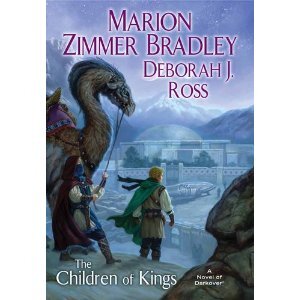 Darkover stories have always at their heart been about transcendent acceptance-not only
Darkover stories have always at their heart been about transcendent acceptance-not onlyone's own acceptance of who and what one is, and not only the acceptance, of one, by others. Darkover's tale of acceptance is the story of how, in the very act of accepting oneself and of the other--which too often is perceived as an act of weakness or simple naivete--instead, brings about a unity of soul and spirit that carries with it immense power and purpose.
The Children of Kings definitely does not disappoint, in this regard. It opens another brilliant chapter into a world of future possibilities, where not only do humans travel between the stars, not only find destiny and heart's home in the strangest of places, but also, find that they can do anything wondrous, build anything marvelous, if they find the way to do it together.
Well done, Children of Kings. Be warned, once you begin this book you will want to continue through to the end.
July 22, 2022
Book Review: Overcoming Deepest Grief, by Mary Aviyah Farkas
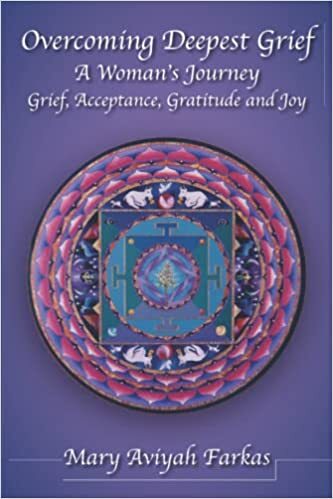
Overcoming Deepest Grief, A Woman’s Journey: Grief, Acceptance, Gratitude and Joy, by Mary Aviyah Farkas
Mary Aviyah Farkas’s book, based mostly on her journal entries, is an intensely personal record of her passage through grief. It begins with a stark retelling of three major losses: the death of her sister, with whom she was very close, followed by discovering the dead body of her long-time lover and the consequent removal of her lover’s possessions from their home by the lover’s family, an incident she describes as “a rape.” The opening essays, written after the journal entries, speak eloquently of the depth of loss, the shock and the grief—experienced by the author. The simplicity of her diction expresses the complexity of her emotions, stemming not only from the deaths of two people she dearly loved but also from the sense of violation when her home was invaded by her in-laws in what she experienced as a callous and rapacious manner.
I think every reader would identify with Farkas’s feelings of shock and horror. As much as we might like to think that physical possessions aren’t important, when we have suffered the loss of someone we love (in this case, two people), items that they owned or shared become precious. Most of us aren’t ready to let go of them until we have done considerable grieving. (Example: I still have my mother’s aprons, 40 years later!) As someone who has experienced grief under complicated circumstances, I understood why Farkas didn’t respond with legal action or even simply kicked them out, and why she could no longer remain in the home she had shared for decades.
The remainder of the book consists of essays and poetry in chronological order, written as Farkas struggled to rebuild her life and rediscover joy and connection. Here is where the universality of the opening shifts into the specificity of her experiences and beliefs. Farkas states clearly that her book is not intended to be a “how-to,” although a few sections contain suggestions; this is a record of what comforted and helped her. Some of her experiences may fall outside the interests or means of ordinary people, for example, her sessions with her bodyworker or her guru. So, too, her use of capitalization denotes esoteric definitions of otherwise common words. I wondered, for example, what was the precise difference between accepting a loved one’s death and Accepting it. Clearly, the choice of diction and punctuation has special meaning for the author, reinforcing the presentation of her unique, personal experience.
Farkas offers her healing journey with remarkable honesty and courage. She is as open about her anguish as about her renewed joy. The importance of her spiritual life shines through the pages. The book won the Silver Nautilus Book Award for “books that support Nautilus’ Four Pillars: Conscious Living & Sustainability; High-Level Health & Wellness; Spiritual Growth; and Positive Social Change & Social Justice.”
I was given a free copy of this book in exchange for an honest review.
July 18, 2022
Time, Patience, and the Beginning Writer
 Beginning writers enjoy the unappreciated luxury of time. They can work without submission deadlines and crash and burn editorial demands. There’s an undeniable glee in such deadlines; they are the mark of a professional author, aren’t they? They demonstrate our commitment to our writing careers, and that our publishers take us seriously. Deadlines, especially short ones, imply an editor’s trust in our ability to work competently, even brilliantly, at speed. Surely, that’s proof of a high degree of Expertise, not to mention Importance.
Beginning writers enjoy the unappreciated luxury of time. They can work without submission deadlines and crash and burn editorial demands. There’s an undeniable glee in such deadlines; they are the mark of a professional author, aren’t they? They demonstrate our commitment to our writing careers, and that our publishers take us seriously. Deadlines, especially short ones, imply an editor’s trust in our ability to work competently, even brilliantly, at speed. Surely, that’s proof of a high degree of Expertise, not to mention Importance. If you haven’t picked up the sarcasm in the opening paragraph, please insert it now. Bleary eyes, aching shoulder muscles, unwashed laundry, family eating frozen dinners, and kids running amok from neglect are nobody’s idea of good working conditions. For many published and publishing authors, these things happen from time to time as a part of the publishing industry’s inherent chaos. If we can’t change them and don’t feel we have the option to refuse, then we make them more acceptable via glamorization of suffering. To be sure, when we were beginning writers, we may well have regarded the necessity of dropping everything to proofread a book that should have been done two months ago as a good thing. We wanted to see our work in print, the sooner the better, and too many of us jumped at the chance of being published anywhere.
The time during when we are writing seriously but not (yet) on contract offers its own gifts, and one of them is freedom from publisher- (or editor- or agent-) induced overwork frenzy. We may be overworking in a different way, juggling day jobs, families, and other responsibilities. Our friends and families may regard our writing as a hobby, no matter how seriously we take it, because we have yet made any money at it. (And when we do, the bar escalates: we haven’t sold a novel, we don’t earn enough to support ourselves entirely from our writing, we haven’t won a national award, etc., and with the achievement of each goal, we are subjected to another, even more difficult one.)
A beginning writer has the flexibility to accept external deadlines, like for submission to an anthology or contest, or to ignore them. He may choose a time-defined goal, like writing a novel in a month for National Novel Writing Month (NaNoWriMo), but he is not contractually obligated to do so. If he realizes the project is headed in the wrong direction and needs to be taken apart and put back together in a completely different way, and to do that, he must acquire new literary skills, he is free to do that. In fact, it’s an excellent thing for a beginning writer to have the awareness he is creating and learning at the same time. During this time, we have all had ideas that were beyond our technical abilities to execute. Even when they failed abysmally, tackling these stories made us stronger writers. Once we are selling on contract and working to deadline, we may no longer have the time to experiment with different techniques, to try various solutions and critically analyze why some worked and others didn’t, and so forth. It is assumed we already have the necessary professional skills to do the job. For many writers, those contracts result in a stagnation of learning. As a result, we run off and write novels “on spec” to keep our creative muses nourished with a sense of adventure and play.
Beginning writers face the daunting reality that over the decades it has become increasingly difficult to sell a first novel. Not only are they in competition with other debut novelists, their editors are also considering manuscripts from seasoned professionals who, for one reason or another, are changing their bylines and perhaps genres, and being published as if they were new authors. Therefore, it’s even more important that first novels be the very best crafted, most original, fully developed, and polished books possible. This takes time, whether it’s your first book or your hundredth. Beginning writers can afford to take the time; indeed, it is incumbent upon them to do so.
New writers aim to make that first novel as good as they can, not only to attract the interest of an agent or make a sale to an editor, but because the quality of a debut novel has a disproportionate influence over their writing careers. Writers can and do recover from a mediocre debut novel with consequent lackluster sales, but it’s a lot harder to sell a second novel. This is why I think that most of the time, self-publishing an otherwise unpublishable (and hence, unedited) first novel is a mistake in terms of a long-term career.
The advice to take the time to master basic literary craft and then apply it is often difficult to accept, let alone follow. When we’re still figuring out how to write well (and how to write this story well), we so often don’t know what we don’t know. Finding trustworthy feedback and then following it slows down the process. I can’t tell you how many times I thought a story was ready for submission and been wrong. Some of us pick up skills easily; others of us need the concepts explained to us in words of one syllable. And all of us want to be able to write perfectly right now.
The stage of late-beginner, when a writer has e sold a few short fiction pieces and is working on a novel, is a particularly hazardous passage. His stories may have attracted positive reviews; he had readers and even fans. His editors know his name. Then an editor asks to see that novel, the one that’s not finished. The rough draft may be complete, or even a revision or several, but it’s not the very best the writer can make it. The request creates the illusion that the sale is halfway accomplished. The writer has leap-frogged over the slush pile! Exhilaration feeds blindness: that novel still has to be competitive and capable of launching a career, but now it’s all too tempting to send it out before the editor forgets the conversation.
To make matters worse, sometimes rushing through writing the rest of the book or skimming through a quick polish does work. More often, though, it doesn’t, and then the best outcome then is that the writer picks up his shattered hopes and is able to return to the novel with renewed dedication. That necessary perspective can be hard when the project has been the source of disappointment. The mere act of submitting an unready manuscript creates the illusion that it is finished, and illusions are notoriously difficult to dispel. Often the best strategy in this circumstance is to set that project aside, go off and do something else — write another novel or a handful of short stories, anything that refreshes the mind and sharpens the critical eye — and then return to it.
Just as it is never too late to begin a writing career, it is worth the time to launch that career. True writing friends, as opposed to those who pressure or sabotage our best interests, help us with patience and long-term perspective. That smashing debut novel is worth it!
July 15, 2022
Short Book Reviews: A Heroine of the Magical Underclass
Servant Mage, by Kate Elliott (Tor)
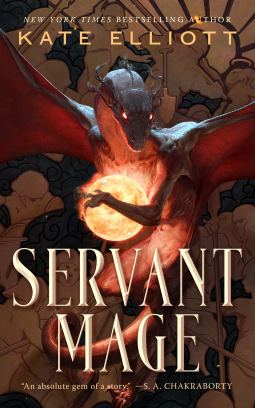
Kate Elliott always delivers entertaining stories with relatable characters, and Servant Mage is no exception. Indentured fire-mage Fellian leads a drab life, half-starved and clinging to memories of her childhood, before the rigid, fundamentalist Liberationists came to power and enslaved anyone with magical power. The usurped Monarchists have formed an underground rebellion, and they need Fellian’s Fire magic. Of course, one among them is devastatingly handsome, thereby setting expectations of romance to come, as well as the restoration of a noble, altruistic king.. Here’s where Elliott departs from the usual and becomes deeply subversive. Fellian holds steadfastly to her own values when presented with an attractive man and the lure of a benevolent monarchy restored. Instead, she asks piercing questions and relies on her own judgment, time and time again. She is keenly aware that the other conspirators need her special talent, and she’s not about to exchange her autonomy for a new community. In short, she thinks for herself. Through her, Elliott strongly questions the romantic notion so prevalent in fantasy: the noble aristocracy, devoted to the welfare of their subjects. Fellian insists that to trust future generations of entitled rulers is folly and that exchanging one form of top-down rule for another is no guarantee against despotism. This emperor might be just and fair, but in a generation, common people like her might find themselves just as oppressed.
I love how respectful Elliott is of her readers’ intelligence. She plays fair and gives us all the information we need (such as Fellian’s passion for literacy in teaching fellow servants to read and write) without ramming conclusions down our throats. She lets the characters and unfolding events speak for themselves without telling us how to feel about them. For this, and for superb storytelling and compelling characters, I’ll grab anything she writes!



